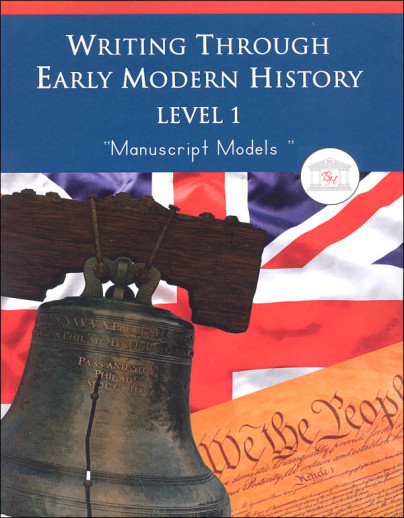We use cookies to make your experience better. To comply with the new e-Privacy directive, we need to ask for your consent to set the cookies. Learn more.
Writing Through Early Modern History Level 1 Manuscript
Writing, grammar, spelling, penmanship practice, literature, reading comprehension, and vocabulary are all taught and practiced using historical narratives, folk stories, cultural tales, and primary source documents. Thisbookincorporates all aspects of Charlotte Mason's interactive view of language arts (i.e. narration/ written summaries/copywork/dictation), integrated with a biblical worldview. Teacher instruction includes descriptions_1 of expected work, daily schedules, and appendices. Student pages provide reading selections, copywork models, and lines. Book is around 350 pages.
A cohesive whole! Isn't this our goal/ideal for the education of our children? But we often see that ideal fragmenting into workbooks and textbooks that isolate skills and bear no relation to one another. This copywork series from Write From History gives you a tool by which you can reclaim the various language arts skill sets of your child's education and bring them under the umbrella of history education thus doing much to restore wholeness. Writing (composition skills), grammar and spelling not to mention penmanship practice, literature exposure, reading comprehension, and vocabulary are all drawn from interesting historical narratives, folk stories, cultural tales, and primary source documents. Whatever your impression/expectation of "copywork" books, this series is probably much, much more. Faithfully incorporating all aspects of Charlotte Mason's interactive view of language arts education (i.e. narration/written summaries, copywork, and dictation), fully integrated with a biblical and Christian worldview, each book in the series provides both a student's copybook and a teacher's manual. Teacher instruction is basic, providing definitions/descriptions of expected work, daily schedules for completion, and appendices with a satisfyingly small number of needed resources. Student pages provide reading selections, copywork models, and lined copying space. [Level 1 lines are 7/16" with a dotted middle line and ¼" between lines; Level 2 lines are ½" or 3/8".]
The overall structure of this series is designed to correlate with a chronological history study typically covered in four years - ancient, medieval, early modern, and modern. It assumes that the student(s) is starting with the ancients in grades 1, 2, or possibly grade 3. Level 1 books focus on narration and copywork and introduce written summaries and dictation. Level 2 books continue narration and copywork and expect written summaries and dictation. Passages are appropriately longer in Level 2. Reading selections in both levels are slightly above the student's grade level encouraging teacher participation and interaction, stretching the student's comprehension skills, and introducing new vocabulary.
The format of the books is similar: table of contents, introduction and teacher information (i.e. detailed explanations of and expectations for narration, copywork, dictation), and schedules (detailed daily and optional) followed by the passages and models. Each book has four chapters. Both levels include chapters with historical narratives, poetry, and cultural tales. Level 1 books have an additional chapter on folk tales while a chapter on primary source documents is added to the Level 2 books. Student pages provide the Reading Selection followed by a Written Summary page and three Model Practice spaces. Because the Level 1 books are intended for younger writers, each Model Practice I in these books provides writing space directly below the passage words. All other Model Practice spaces follow the passage. Appendices in each book include oral narration questions, a grammar guide (labels and definitions as well as a month by month color coding teaching plan appropriate to the book's level), and a complete collection of the models (by chapter).
Lots of flexibility is built into this program (as you would expect from a CM-based program). Each book is a stand-alone and could be picked up and started at any level, with any historical time period. Within each book and between books, there is progressive expectations in terms of skill development; i.e. the teacher is expected to be continually "raising the bar" in terms of thoroughness of lesson completion. This means that the opposite is also true - each book can be started with a lowered expectation to accommodate the student's lack of experience with the methodologies involved. Within each book, the reading selections and models can be used in any order and will probably be selected to correspond with history studies. Choices are plentiful - enough to provide models for daily narration, copywork, or dictation assignments (i.e. two reading selections and models each week) for about 30 weeks. The table of contents lists each selection/model, usually providing a time reference. Obviously, the books should be chosen to accommodate handwriting preferences/abilities. While all follow a traditional style, books are available with either manuscript models or cursive models.
From a teacher's perspective, this series is easy to use, easy to follow and teacher prep is virtually nil. However, it does assume significant teacher-student interaction so time with multi-age students should be planned accordingly. The daily lessons are interesting (I might even say fascinating) and relatively short; probably only requiring 20-30 minutes in Level 1 and 30-40 minutes in Level 2. This series provides a wonderful win-win situation. History studies are enhanced by the well-selected passages and language arts lessons are more interesting because they tell "the rest of the story". Books vary in size but are approximately 350 pgs, spiral-bound or paperback. ~ Janice
| Product Format: | Paperback |
|---|---|
| Brand: | Brookdale House |
| Grades: | 1-2 |
| ISBN: | 9781642810387 |
| Length in Inches: | 11 |
| Width in Inches: | 8.5 |
| Height in Inches: | 0.8125 |
| Weight in Pounds: | 2 |

